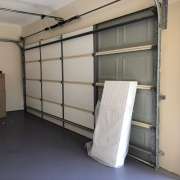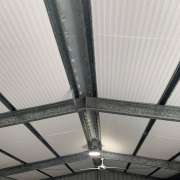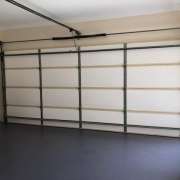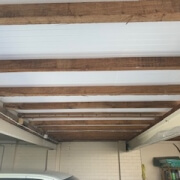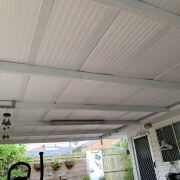Garage Door, Shed, Patio, and Underfloor insulation is designed and made locally by Queensland Polystyrene Specialists and is very different from any other insulation product on the market. Although due to its unique, simple, and revolutionary Patented Concertina cut to size panels, they will easily flex into the sections of your garage door, shed roof, wall purlins, and underfloor joists, batons and sit above the rafters (Australian Patent No. 2012101977).
This not only makes the insulation product quick and easy to install, it also ensures a firm snug fit for the best-continued insulation performance over the life of your home or shed.
The Benefits of Polystyrene Insulation
Polystyrene insulation offers excellent thermal resistance, helping to regulate temperature and keep spaces comfortable year-round. It’s moisture-resistant, making it ideal for areas like garages and sheds prone to dampness. The material is lightweight, durable, and cost-effective, making it easy to install and maintain. Additionally, it provides some soundproofing and is resistant to mold and mildew. Overall, polystyrene is a practical and budget-friendly option for improving energy efficiency and comfort in outbuildings.
Frequently Asked Questions:
What is Expanded Polystyrene?
Expanded polystyrene (EPS) is a lightweight, rigid foam material made from tiny beads of polystyrene that are expanded and fused together. It’s highly effective as insulation due to its excellent thermal properties, which help reduce heat transfer and improve energy efficiency. EPS is also moisture-resistant, durable, and relatively affordable compared to other insulating materials. Its ease of handling and installation, along with its ability to provide solid insulation without compromising space, make it one of the most recommended choices for both residential and commercial applications.
How effective is EPS as a thermal insulation material?
Polystyrene is highly effective as a thermal insulation material due to its low thermal conductivity, which helps reduce heat transfer and maintain a stable temperature. Its closed-cell structure traps air, providing excellent resistance to heat flow, keeping spaces warm in the winter and cool in the summer. This makes it an efficient choice for improving energy efficiency in buildings, as it minimizes heat loss or gain, ultimately reducing heating and cooling costs.
Does age effect the thermal performance of EPS?
Yes, the thermal performance of expanded polystyrene (EPS) can be affected by age, though it generally remains effective for many years. Over time, EPS can experience a slight decrease in its insulating properties due to factors like the breakdown of its air pockets, exposure to UV light, and prolonged moisture exposure. However, this degradation is usually minimal in typical applications, as EPS is quite durable and stable. In most cases, the material’s thermal performance remains consistent for decades, but to maximize its lifespan, it’s important to protect it from direct sunlight and moisture, especially in outdoor applications.
How effective is EPS as an acoustic insulation material?
EPS can provide some level of acoustic insulation, but it is not as effective as specialized soundproofing materials. Its structure—made up of small, air-filled pockets—can help reduce sound transmission to a certain extent, especially in reducing airborne noise. However, EPS doesn’t offer significant soundproofing capabilities for more intensive noise control, such as blocking heavy machinery noise or high-impact sounds. For better acoustic performance, you would typically combine EPS with other materials, like mass-loaded vinyl or fiberglass, to enhance its soundproofing properties in areas where noise control is a priority.
How is EPS environmentally friendly?
EPS is considered environmentally friendly in several ways. It is made from recyclable materials, and while it is a plastic foam, its production process uses less energy compared to many other insulation materials. Additionally, EPS can be recycled after use, although its recycling rates vary depending on local infrastructure. The material is lightweight, which reduces transportation energy costs and carbon emissions. Furthermore, EPS has a long lifespan, meaning it doesn’t need to be replaced often, contributing to less waste over time. However, it’s important to ensure that EPS is disposed of properly to prevent environmental pollution, as it can take a long time to break down in landfills. Overall, when used responsibly, EPS provides an eco-friendly option for insulation.
What is the difference between foil insulation and polystyrene insulation
Foil insulation is a reflective material, typically with a layer of foam or bubble wrap, that works best by reflecting radiant heat, making it ideal for hot climates or summer use. It’s lightweight, moisture-resistant, and effective in spaces where heat enters through radiation, but less effective at blocking conductive heat. Polystyrene insulation (either EPS or XPS) is a rigid foam that resists heat transfer through conduction, providing good thermal resistance for both hot and cold environments. It’s thicker and more durable than foil, but doesn’t reflect radiant heat. Polystyrene works well in colder climates, whereas foil excels in reflecting heat in war
How to Recycle Polystyrene:
In Brisbane, polystyrene is not accepted in curbside recycling bins, but there are a few options for proper disposal. Some of Brisbane’s Resource Recovery Centres (like at Murarrie and Geebung) may accept clean, uncontaminated polystyrene, so it’s a good idea to contact them ahead of time to confirm. Additionally, some local retailers like Woolworths may have collection bins for clean polystyrene packaging, especially from items like white goods. You can also check the Recycling Near You website by Planet Ark to find drop-off points or special recycling events in Brisbane.
If recycling options are not available or convenient, polystyrene must go into your general waste bin, as it is non-biodegradable and will end up in landfill. To minimize environmental impact, it’s important to ensure the polystyrene is clean and free of contaminants before attempting to recycle it. In some cases, businesses or specialized services may accept larger quantities for commercial recycling, so it’s worth asking around. Alternatively, you can repurpose polystyrene for DIY projects as a short-term solution.
Polystyrene Drop Off Locations:
Woolworths or Bunnings stores, have drop-off stations for polystyrene recycling. You can also search for any upcoming community recycling events through Brisbane City Council or the Recycling Near You website to see if there are temporary collection points for polystyrene near Rocklea.
At the beginning of 2020 Queensland Polystyrene Specialists (QPS) had been approved by AUSowned.
AUSowned has been established to help support Australian Owned Business by verifying that they are Australian Owned Companies.
The star rating on QPS’s badge displays what level of Australian Owned Company that they are. Therefore, three stars mean that QPS are 100% Australian owned, and their production and services are conducted in Australia.
Furthermore, it also means that QPS has no sneaky tricks and have the correct tax paid in Australia, and none of their profits are sent overseas.
For more information about AUSowned check out www.AusOwned.com.au

